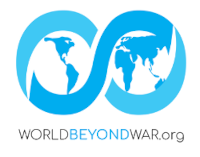
“I’m going to perform a magic trick by reading your mind,” I tell a class of students or an auditorium or video call full of people. I write something down. “Name a war that was justified,” I say. Someone says “World War Two.” I show them what I wrote: “WWII.” Magic!
I have to perform my WWII magic trick fairly early in the lecture, because if I don’t, if I talk too long about defunding militarism and investing in peace, then too many people will have already interrupted me with questions like “What about Hitler?” or “What about WWII?” It never fails. I talk about the unjustifiability of war, or the desirability of ridding the world of wars and war budgets, and somebody brings up WWII as a counter-argument.
What does WWII have to do with military spending? In the minds of many it demonstrates the past and potential need for military spending to pay for wars that are as justified and necessary as WWII supposedly was.
When you start talking about a major conversion to peaceful enterprises, or nuclear abolition, or the eventual abolition of militaries, you run headfirst into this surprising topic that has very little to do with the world you currently live in: WWII.
Our online course, starting soon, is called Leaving World War II Behind.
The course lays out the case for why misconceptions about World War II and its relevance today should not be shaping public budgets. When less than 3% of U.S. military spending could end starvation on earth, when the choice of where to put resources shapes more lives and deaths than all the wars, it matters that we get this right.
It ought to be possible to propose returning military spending to the level of 20 years ago, without a war from 80 years ago becoming the focus of the conversation.
Is a new Hitler coming?
Is a surprise recurrence of something resembling WWII likely or possible?
The answer to each of those questions is no. To understand why, it may help to develop a better understanding of what World War II was, as well as to examine how much the world has changed since WWII.
It really doesn't matter if we find WWII interesting. As long as we find preserving life on Earth interesting, we have a responsibility to tackle the myths of WWII that are standing in the way of peace.
In Ukraine right now, both sides claim to be re-fighting World War II. Both sides are dealing in mythology. The pair of them may get us all killed.
Check out this online course, and sign up to help change our understanding of the world.
—David Swanson, World BEYOND War
World BEYOND War is a global network of volunteers, chapters, and affiliated organizations advocating for the abolition of the institution of war.
Donate to support our people-powered movement for peace.









Opt-in to mobile updates. Manage email preferences. Privacy policy.
Should giant war-profiteering corporations decide what emails you don't want to read? We don't think so either. So, please stop our emails from going into "junk" or "spam" by "white listing," marking as "safe," or filtering to "never send to spam."
World BEYOND War | 513 E Main St #1484 | Charlottesville, VA 22902 USA
World BEYOND War | 450, 4-2 Donald Street | Winnipeg, MB R3L 0K5 Canada